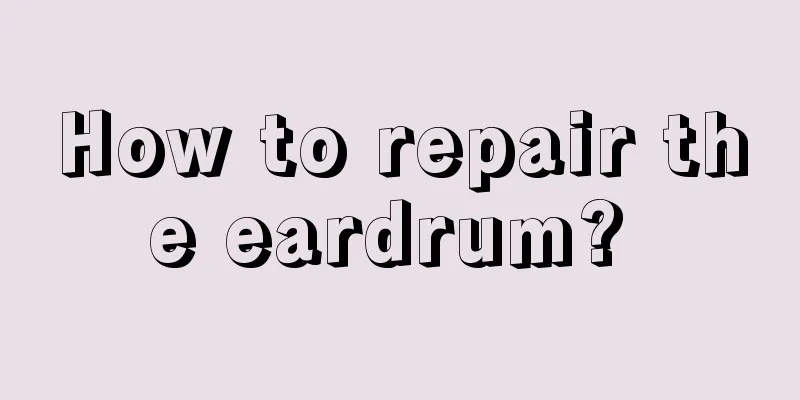How to repair the eardrum?

|
The ear is a tool for people to receive information. Its components are relatively complex, consisting of two major parts: the auricle on the outside and the ear canal on the inside. At the end of the internal ear canal is the eardrum, which is the processing center that receives sound and converts it into information that can be recognized by brain cells. Therefore, the importance of the eardrum is self-evident. Although the eardrum is inside the ear canal, it can be damaged in certain situations, such as bath water entering the ear, sharp objects piercing the eardrum, etc., which are common phenomena in life. If the degree of injury to the eardrum is minor, it can be repaired by medical means. Let’s take a look at how to repair the eardrum. When the eardrum is perforated due to external pressure, puncture, inflammation, etc., it is like a broken drum that no longer makes any sound, and people can no longer hear any sound. After the eardrum is perforated, the middle ear tissue will undergo inflammatory pathological changes and will also be susceptible to infection by external bacteria. Therefore, the best approach is to repair the eardrum, which is called tympanostomy. (I) Cauterization Suitable for small eardrum perforations 1. Apply a cotton pad soaked in 2% tetracaine solution to the remaining surface of the tympanic membrane for 15-20 minutes. 2. Use a small cotton swab dipped in 0.1% thimerosal tincture or 70% ethanol to disinfect the external auditory canal and the remaining tympanic membrane. Be sure not to allow the disinfectant to overflow into the tympanic cavity. 3. Use a fine probe to make a small cotton swab, dip it in 50% trichloroacetic acid solution, and carefully apply it to the edge of the perforation to create a 0.5-1.0mm white burning circle at the edge of the perforation. The purpose is to remove the epithelium and scar at the edge of the perforation and promote the regeneration of the eardrum. After cauterization, apply a thin cotton pad containing 5% urea solution to promote the growth of the perforated tympanic membrane. After the operation, 5% urea solution was dripped 3 times a day. The cotton pad was removed after 1 week. If the perforation failed to close, it could be cauterized again until it closed. The cauterization method often needs to be repeated several times, and you should be patient and persist. (II) Scrape and stick method For smaller eardrum perforations 1. Apply a 2% tetracaine wet cotton pad to the remaining tympanic membrane for 15-20 minutes. 2. Disinfect the external auditory canal and the surface of the tympanic membrane with a cotton swab soaked in 0.1% thimerosal tincture or 70% ethanol. 3. Use a thin needle to scrape off the epithelium at the edge of the perforation and the epithelium 1-2mm away from the edge of the perforation. It can reach the fibrous layer of the tympanic membrane but cannot penetrate it. After the operation, a thin cotton pad soaked in 5% urea solution can be applied. Thereafter, 5% urea solution should be dripped three times a day to promote the growth of the tympanic membrane. Remove the cotton pad after 1 week. If the perforation fails to close, repeat the above operation until the eardrum heals. |
>>: How to treat facial burns?
Recommend
How to get rid of moisture
Almost everyone has experienced the phenomenon of...
Tips for protecting teeth
In fact, many people do not pay much attention to...
How much sleep is normal for a 20-month-old baby?
Under normal circumstances, a 20-month-old baby s...
Are ampullary gland cancer and pancreatic cancer the same thing?
Ampullary adenocarcinoma and pancreatic cancer ar...
How to treat angular cheilitis
We may encounter various diseases in our daily li...
The role of artemisinin
In medicine, various chemical elements are extrac...
Effects of focused ultrasound knife and postoperative care
Love of beauty has become the pursuit of contempo...
How to stay away from stomach cancer
The occurrence of gastric cancer is the result of...
Tinnitus and stuffy ears may also be early symptoms of nasopharyngeal cancer
At present, the early symptoms of nasopharyngeal ...
There are many main symptoms of bladder cancer
Cancer can separate people from life and death. T...
Can people with bladder cancer eat mutton
Bladder cancer patients should eat foods rich in ...
What causes excessive earwax?
We must be clear that earwax is produced by the s...
What toothpaste to use for bad breath
There are many reasons for bad breath. On the one...
What is the formula of facial mask essence?
Many people have the habit of applying facial mas...
Things to note when exercising in autumn for patients with bladder cancer
What should bladder cancer patients pay attention...









